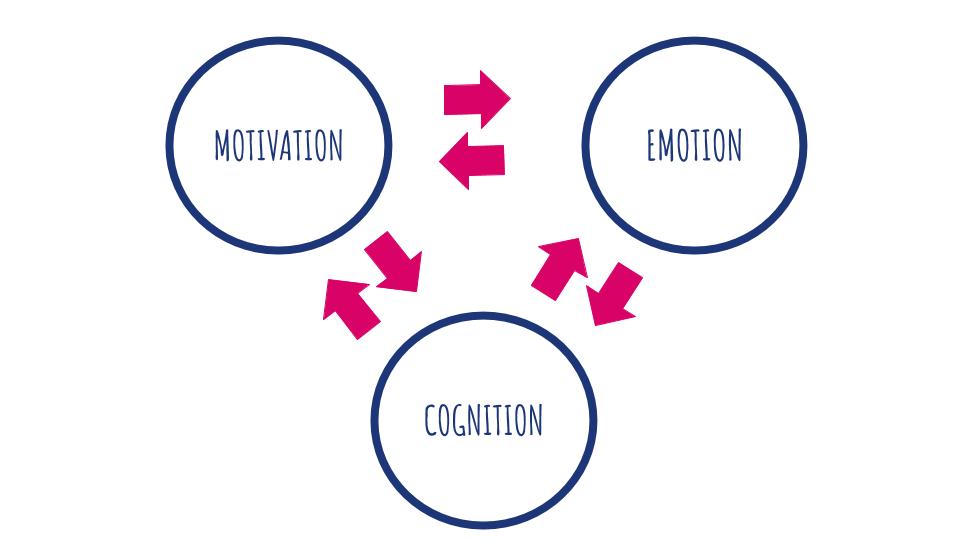2
In the Science of Learning (SOL), we often talk about three areas that greatly influence learning. Three interrelated areas: motivation, emotion, and cognition (Ainley, 2006). All are critical. For Project Illuminated, the focus is primarily on the cognitive aspects – and on the concept of ‘durable learning.’ Diane Halpern, a former president of the American Psychological Association, and Milton Hakel (2003) write that, “We are teaching for some time in the future when the knowledge and skills that are learned in our classes are tested in contexts that we cannot know and with assessments that we cannot design. We need to provide an education that lasts a lifetime…” This quote summarizes our perspective. We not only teach to have students perform well academically but also for students to be able to use what they’ve learned to improve their lives – beyond academics. This requires that they remember what they’ve learned beyond the tests they take. Unfortunately, many students forget much of what they’ve learnt despite performing well on tests (Bacon & Stewart, 2006). Striving for “learning that lasts a lifetime” involves teaching for long-term retention and transfer.

Mastery of Knowledge
“Learning is not an event, but rather a process that unfolds over time.” (Stahl et al., 2010). Durable learning requires practice (repetition, review, elaboration). Learning results from how we experience and accumulate events over time and the patterns we find in such events across time (Maiese, 2017; Kukushkin & Carew, 2017). This message is important not just for us as educators but also to convey to students – as students often get the impression that learning is an event. Student impressions of learning can be inf luenced by how we commonly measure learning (e.g. we commonly use isolated tests rather than recurring measures of learning that provide students with the opportunity to correct errors and improve on their initial results); how we schedule learning (e.g. complete a topic and move on rather than integrating topics and coming back to them multiple times throughout a course). A useful way to think about learning is in the context of the progression from a novice to an expert. Students generally start as novices in a topic, and, as educators, we try to move them to a higher level of expertise. Most students will not become experts, but we work to help them move along a continuum to gain greater proficiency – a level of expertise. Stahl et al. (2010) provides a model of this progression from novice to experts for medical education. Many studies are conducted in continuing medical education as health professionals such as doctors and surgeons continually need to update their knowledge and practices. Health professionals not only have to become comfortable in new knowledge but also have to become proficient at constantly applying such knowledge. They require durable learning and a transfer from a learning setting to an authentic practice. Their behaviour needs to change as a result of what they’ve learned. The model of Stahl et al. (2010) suggests that to achieve this consistent change to their practice or behavioural change, the learners need to have confidence in their knowledge. This confidence comes from mastery of the knowledge. Mastery requires retention. They have to remember what they’ve learned. And retention or remembering of this knowledge can be greatly facilitated by the strategies that both they and their teachers use (Hascher, 2010). In sum, the regular use of new knowledge requires confidence. Confidence requires mastery. Mastery requires retention. Retention requires proper strategies. If we intend to help learners apply what they learn in classrooms in the real world, we need to strive for behavioural change – and can support this change with the teaching strategies we choose to use.
References
Durable Learning
- Ainley, M. (2006). Connecting with learning: Motivation, affect and cognition in interest processes. Educational Psychology Review, 18(4), 391-405.
- Halpern, D. F., & Hakel, M. D. (2003). Applying the science of learning to the university and beyond: Teaching for long-term retention and transfer. Change: The Magazine of Higher Learning, 35(4), 36-41.
- Bacon, D. R., & Stewart, K. A. (2006). How fast do students forget what they learn in consumer behavior? A longitudinal study. Journal of Marketing Education, 28(3), 181-192.
Mastery of Knowledge
- Stahl, S. M., Davis, R. L., Kim, D. H., Lowe, N. G., Carlson, R. E., Fountain, K., & Grady, M. M. (2010). Play it again: The master psychopharmacology program as an example of interval learning in bite-sized portions. CNS spectrums, 15(8), 491-504.
- Maiese, M. (2017). Transformative learning, enactivism, and affectivity. Studies in Philosophy and Education, 36(2), 197-216.
- Kukushkin, N. V., & Carew, T. J. (2017). Memory Takes Time. Neuron, 95(2), 259-279.
- Hascher, T. (2010). Learning and Emotion: perspectives for theory and research. European Educational Research Journal, 9(1), 13-28.
Media Attributions
- LUM eBook Graphics
